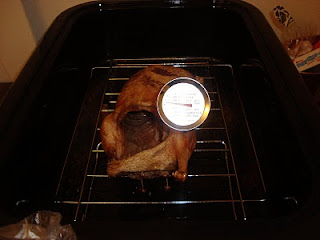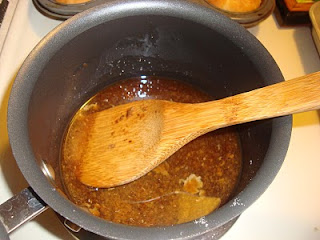It's hard to know why we decided to make Roast duck a l'orange (bigarade). I think it's partially because we found a duck that was priced within our budget and I knew there was a duck recipe on the randomly selected list. We actually found guinea hen, pheasant, and goose, too (although we didn't buy them).
Rachel and I discussed an issue that constantly comes up and I'd really like to have some other opinions on the subject. Although less than previous editions, the 2006 edition of TJOC still has a sizable amount of recipes that require you to make other component recipes. My rule of thumb is that when you can still judge each component piece (as in Steak Diane), I count all the pieces (the sauteed steak, as well as Steak Diane). When they all meld together (Mashed potato stuffing will be one, when I get to it), I can only judge the final piece. Do you think that is fair?
Roast duck a l'orange is essentially just Roast duck (p. 447) with Sweet-sour orange pan sauce (p. 548) poured over it. In fact, that's exactly what it is--the TJOC recipe for duck a l'orange is only three sentences long. It is exactly the sort of recipe that people mean when they say they hate all the flipping that you have to do when cooking with TJOC.
I feel I can count off all three recipes with this one.
My duck:

I took the duck, popped it in the electric roasting pan, and cooked it for just over an hour:

Easy!
Time for the pan sauce. I removed the zest from an orange using a vegetable peeler, an incredibly easy zest removal method that I had never thought of previously. It took the perfect amount of zest with no pith. I cooked the zest for about a minute in boiling water, drained the zest, and then rinsed it again:

We poured chicken stock in to the roasting pan and simmered it, scraping up the browned duck bits:

I cooked white wine vinegar and sugar in a saucepan until they started to brown and then added the contents of the roasting pan.

I stirred together cornstarch and water until smooth and added it to the sauce, simmering for one minute. The orange zest was added, along with orange juice, a bit of Grand Marnier, lemon juice, and salt and pepper:

The sauce was poured over the bird, resulting in duck a l'orange.
Like a huge idiot, I don't have a final picture of the finished product.
This wasn't a true "bigarade" because we didn't use a Seville orange.
Rachel and I had been joking for days that we would be eating duck at midnight. We both didn't care because we weren't planning for true "meals" but rather to snack as dishes were ready. Of course, at 11:57 pm I was pouring the orange sauce over the duck. We ate duck at midnight.
The duck was good. It's definitely better if you like dark meat, which I do. The sauce was very, very orange-y, so stay away from this one if you don't love orange flavor. The roasting method resulted in a terrific crispy skin that was absolute perfection.
Random facts (if no reference, then it's my personal knowledge):
- Almost 75% of all the citrus fruit produced in the world are oranges (On Food and Cooking, p. 375)
- Ducks are mostly dark meat due to the high concentration of red muscle fibers, a requirement for migratory birds
- Grand Marnier uses the "distilled essence" of the bitter orange (Wikipedia)
 Technorati Favorites">
Technorati Favorites">
No comments:
Post a Comment
I love comments! Please let me know what you think!
I'm really sorry, I hate comment moderation, but I've been getting annoying Japanese spam messages lately so...comment moderation has started.